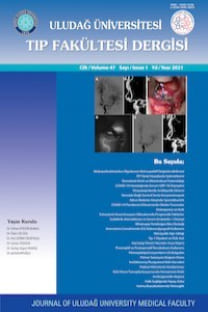T-47D Meme Kanseri Hücreleri Üzerinde Kurkuminin Doz Bağımlı Etkisinin İncelenmesi
Kurkumin, Meme Kanseri, T-47D Meme Kanseri Hücreleri
Investigation of Dose-Dependent Effect of Curcumin on T-47D Breast Cancer Cells
Curcumin, Breast Cancer, T-47D Breast Cancer Cells,
___
- Liu D, Chen Z. The effect of curcumin on breast cancer cells. J Breast Cancer. 2013;16(2):133-7.
- Hu S, Xu Y, Meng L, Huang L, Sun H. Curcumin inhibits proliferation and promotes apoptosis of breast cancer cells. Exp Ther Med. 2018;16(2):1266-72.
- Shen H, Shen J, Pan H, Xu L, Sheng H, Liu B, et al. Curcumin analog B14 has high bioavailability and enhances the effect of anti‐breast cancer cells in vitro and in vivo. Cancer Sci. 2021;112(2):815-27.
- Choudhuri T, Pal S, Agwarwal ML, Das T, Sa G. Curcumin induces apoptosis in human breast cancer cells through p53-dependent Bax induction. FEBS Lett. 2002;512(1-3):334-40.
- Fabianowska-Majewska K, Kaufman-Szymczyk A, Szymanska-Kolba A, Jakubik J, Majewski G, Lubecka K. Curcumin from Turmeric Rhizome: A Potential Modulator of DNA Methylation Machinery in Breast Cancer Inhibition. Nutrients. 2021;13(2):332.
- Patra S, Pradhan B, Nayak R, Behera C, Panda KC, Das S, et al. Apoptosis and autophagy modulating dietary phytochemicals in cancer therapeutics: Current evidences and future perspectives. Phytother Res. 2021.
- Khojaste E, Ahmadizadeh C. Catechin Metabolites along with Curcumin Inhibit Proliferation and Induce Apoptosis in Cervical Cancer Cells by Regulating VEGF Expression In-Vitro. Nutr Cancer. 2021:1-10.
- Bhatia M, Bhalerao M, Cruz‐Martins N, Kumar D. Curcumin and cancer biology: Focusing regulatory effects in different signalling pathways. Phytother Res. 2021.
- Giordano A, Tommonaro G. Curcumin and cancer. Nutrients. 2019;11(10):2376.
- Al-Ejeh F, Kumar R, Wiegmans A, Lakhani S, Brown M, Khanna K. Harnessing the complexity of DNA-damage response pathways to improve cancer treatment outcomes. Oncogene. 2010;29(46):6085-98.
- Udagawa T, Wood M. Tumor–stromal cell interactions and opportunities for therapeutic intervention. Curr Opin Pharmacol. 2010;10(4):369-74.
- Clusan L, Le Goff P, Flouriot G, Pakdel F. A closer look at estrogen receptor mutations in breast cancer and their implications for estrogen and antiestrogen responses. Int J Mol Sci. 2021;22(2):756.
- Kunnumakkara AB, Anand P, Aggarwal BB. Curcumin inhibits proliferation, invasion, angiogenesis and metastasis of different cancers through interaction with multiple cell signaling proteins. Cancer Lett. 2008;269(2):199-225.
- Shakeri A, Ward N, Panahi Y, Sahebkar A. Anti-angiogenic activity of curcumin in cancer therapy: a narrative review. Curr Vasc Pharmacol. 2019;17(3):262-9.
- Rowe DL, Ozbay T, O'Regan RM, Nahta R. Modulation of the BRCA1 protein and induction of apoptosis in triple negative breast cancer cell lines by the polyphenolic compound curcumin. Breast cancer: basic and clinical research. 2009;3:BCBCR. S3067.
- Banerjee M, Singh P, Panda D. Curcumin suppresses the dynamic instability of microtubules, activates the mitotic checkpoint and induces apoptosis in MCF‐7 cells. The FEBS journal. 2010;277(16):3437-48.
- Mehta K, Pantazis P, McQueen T, Aggarwal BB. Antiproliferative effect of curcumin (diferuloylmethane) against human breast tumor cell lines. Anticancer Drugs. 1997;8(5):470-81.
- Chiu T-L, Su C-C. Curcumin inhibits proliferation and migration by increasing the Bax to Bcl-2 ratio and decreasing NF-κBp65 expression in breast cancer MDA-MB-231 cells. Int J Mol Med. 2009;23(4):469-75.
- Nagaraju GP, Aliya S, Zafar SF, Basha R, Diaz R, El-Rayes BF. The impact of curcumin on breast cancer. Integrative Biology. 2012;4(9):996-1007.
- Chattopadhyay I, Biswas K, Bandyopadhyay U, Banerjee RK. Turmeric and curcumin: Biological actions and medicinal applications. Curr Sci. 2004:44-53.
- Pandya N, Khan E, Jain N, Satham L, Singh R, Makde RD, et al. Curcumin analogs exhibit anti-cancer activity by selectively targeting G-quadruplex forming c-myc promoter sequence. Biochimie. 2021;180:205-21.
- ISSN: 1300-414X
- Yayın Aralığı: 3
- Başlangıç: 1975
- Yayıncı: Seyhan Miğal
Oktay KAYA, Deniz ERÇETİN, Muhammed Ali AYDIN, Melike SAPMAZ
Ventriküloperitoneal Şant Kateter Distal Ucunun Torasik Migrasyonu: Olgu Sunumu
Reyhan KASAB, Pınar ESER OCAK, Yağmur TUNÇBİLEKLİ, Sami BAYRAM, M Özgür TAŞKAPILIOĞLU
Semptomatik Kalça Ağrısının Nadir Görülen Bir Nedeni: Sinoviyal Pit: Olgu Bazlı Derleme
Sema SERTER KOÇOĞLU, Levent ELMAS, Mücahit SEÇME
Ekin EFE, Attila DAĞDEVİREN, F. Figen KAYMAZ, Ahmet Çevik TUFAN
Hüseyin MELEK, Tolga Evrim SEVİNÇ, Deniz SIĞIRLI, Ahmet Sami BAYRAM, Cengiz GEBİTEKİN
Hipotalamusta İyonotropik Glutamat Reseptör Ekspresyonu: İmmunohistokimyasal Lokalizasyon Çalışması
Duygu GÖK YURTSEVEN, Gonca TOPAL, Zehra MİNBAY, Özhan EYİGÖR
Üzerine Televizyon Düşmesi Sonucu Meydana Gelen Çocuk Ölümlerinin Retrospektif Değerlendirilmesi
Ertuğrul GÖK, Recep FEDAKAR, Süleyman SİVRİ
Seçil AK AKSOY, Berrin TUNCA, Tuncay YILMAZLAR, Ersin ÖZTÜRK, Fuat AKSOY, Özgen IŞIK, Ömer YERCİ, Nesrin UĞRAŞ, Özkan KANAT, Melis MUTLU, Çağla TEKİN
